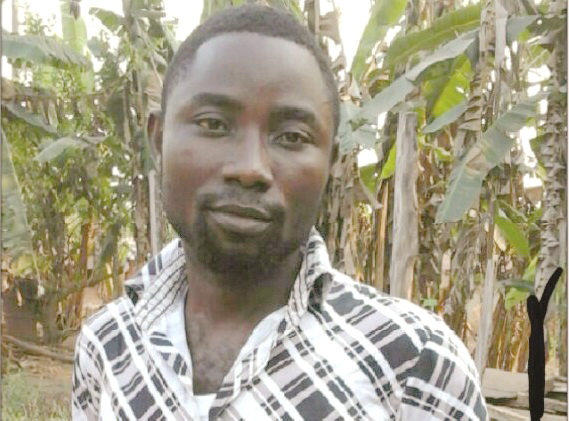
Bismark Kissi, the microlivestock farmer with unyielding energy
Bismark Kissi’s business has no name, no signage to point to the pig farm and therefore no tax identity. His farm is not on the outskirts of town, as is the ideal so that his little enterprise poses no nuisance to other community members. But he is proud of his enterprise and is working tirelessly to make it succeed.
Bismark was born some twenty six years ago in Nkawkaw, in a town famous for traditional clayware (Nkawkaw Kuma). His father and mother supported him until he completed the senior high school. But when Bismark and his parents laboured to get him to take the WASSCE examinations and compilations ensued subsequently, leading to the withholding of Bismark’s results and those of his colleagues, his mother’s heart broke.
The family tried to sue the school for not registering the school with the West African Examinations Council at the time it registered students. The case was referred to the ADR. It was later discarded.
When formal education failed to produce the kind of miracle he expected and coupled with the failure of the lawsuit to fix the issue, Bismark started looking elsewhere. He found resources and put himself through an apprenticeship as a heavy duty equipment operator. Three years late, he obtained a licence entitling him to operate a backhoe loader and pay loader. And while he waited for someone to assign him his machine, Bismark did whatever could bring him some legitimate earnings, however menial and little such enterprises were.
Three years later, Bismark saved enough. He returned home to find what opportunities there were back in his mother’s village that he could leverage on. He found his mother’s rural house empty. But when he asked her to delimit the entire plot, so much space lay idle. By the time Bismark came again to inspect the property for the third time, a business idea, fanciful though, had crossed his mind. He wanted to set up a pig farm.
The community of Dagyansa is situated about 3.5 kilometres off the then highway linking Nkawkaw to Kumasi. From the new highway bypassing the Nkawkaw township, the village of Danyansa will be a little over five kilometres. Its population, when census is taken during the Easter, may be twice the number usually resident in the community.
Daynasa’s location gives it a unique geography. Forest belted from all four corners, the community has vast timber and lumber resources and water bodies that continue to run the entire year round. Bismark was going to exploit this special advantage to his benefit. He felled as much wood as would provide shelter for his pigs. After chain sawing the timber, he allowed it time to dry. Bismark then set out, himself, nail and hammer in hand, to build a piggery.
By the time Bismark finished building the piggery, his resources had shrunk to a trifle. These resources could only procure for him three young sows and a boar. He started breeding. This was late 2014.
Knowledge stocking with BAC
On his routine work, an officer of the Business Advisory Service ran into Bismark in the fall of 2014. After interacting with the novice pig farmer, his interest in the young man went high and over the roof. Bismark was registered with the BAC local office in Nkawkaw. He had been shortlisted for some up-and-coming animal husbandry training.
Bismark waited for the intended training for weeks and months. After the fifth month, he ruled out any chances of this free, government-sponsored livestock training ever seeing the light of day. However, when he received a call after the expiration of the sixth month, summoning him to the Kwahu West Municipal Assembly, he could hardly believe his ears.
The training in Adidome Farm Institute in faraway Volta Region took place with Bismark participating. And that training, he would admit to me in the course of the interview, was brief but phenomenally transformational. It upped his game, pushed his horizons further, equipped him with livestock knowledge he had sought in vain and finally gave him marketing tips that he hoped would find usefulness as his farm grew.
Capital challenge
Bismark, like any other young person starting their business, has challenge with capital. But unlike the others, this pig farmer is bank averse. He tells me that he needs capital for expansion but does not want to approach a formal financial institution on account of the many sour tales he had heard. Even though his fears are founded on hearsay, he tells me that banks are only friends in good times. “When bad times come, which is an unavoidable cycle in business, formal finance institutions are an unrelenting enemy.”
Bismark is mad about the current marketing conditions of the livestock he breeds. He tells me that because of the underdeveloped nature of the market for pigs, pork butchers and retailers are the ones who are cashing in on the trade, leaving the farmer worse off.
Prospects
Bismark’s heavy equipment operating licence lies in his drawer, gathering dust. He hasn’t looked at it in the last two years. What he has been busy doing, especially since returning from the Business Advisory Centre training in Adidome, is concentrating on his farm work and finding knowledge, expertise and whatever it takes to outdo his current potentials.
Bismark has lately become a huge blessing to other livestock breeders in his immediate region. He provides free, minimum veterinary services to the farmers around.
Bismark is young, energetic, enthusiastic and daring. He has assembled all his intellect and brute energies and invested these into his young farm. With his mother as the lead employee, Bismark leads his small staff by example. He looks to me like a young adult for whom success, however illusive, cannot play tricks on.